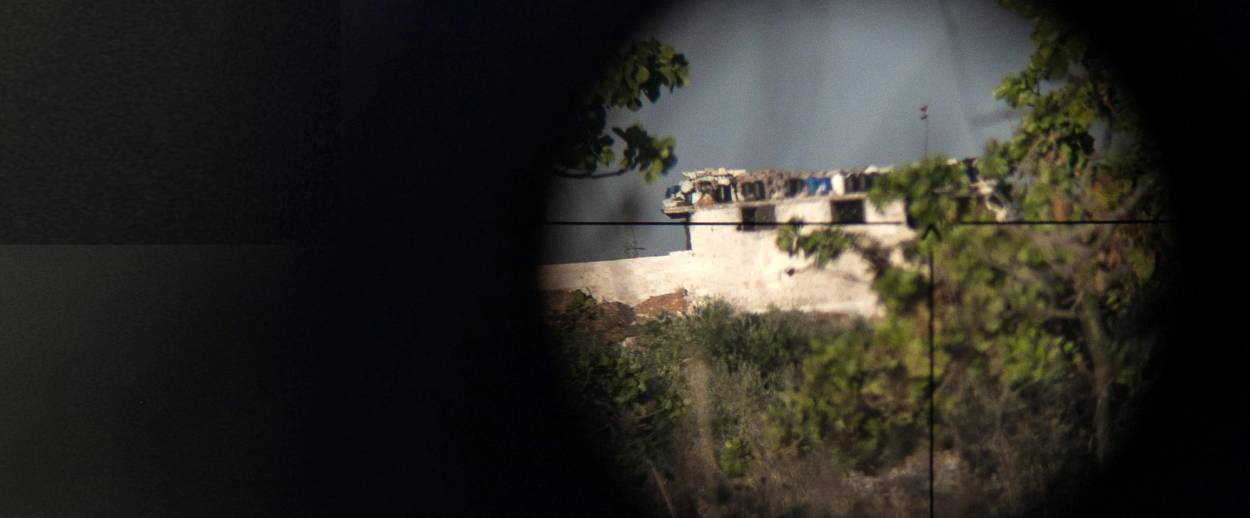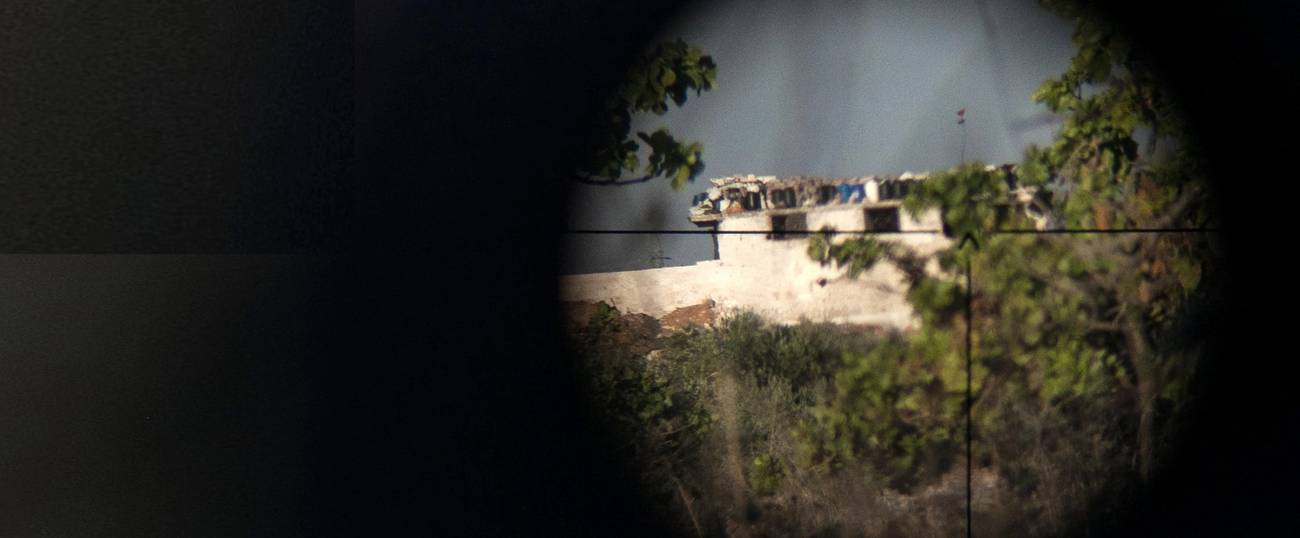The Unsettling Exploits of Daniel Silva’s Mossad Superspy
In the new thriller ‘The Black Widow,’ master Israeli agent Gabriel Allon is forced to confront hard questions about ISIS




Thrillers are good beach reading because, like the beach, they are supposed to provide a vacation from real life. The hero is quicker, smarter, and stronger than any real secret agent; the villain, more ingeniously villainous. But most important, the hero is supposed to win: He stops the ticking time bomb, thwarts the terrorist, rescues the girl. This is a comforting antidote to the way the world works—especially lately—because in reality, the bad guys very often get away with it. Every successful suicide bombing is a thriller gone wrong.
Which is why Daniel Silva’s latest blockbuster, The Black Widow, makes for such unsettling summer reading. This book was my first acquaintance with Silva and with his hero, the master Israeli spy Gabriel Allon, who has starred in more than a dozen novels. But since it is full of call-backs to Allon’s previous adventures, I already feel I know him pretty well. He got his start as a spy and assassin when he was assigned to hunt down the Palestinian terrorists who killed Israeli athletes at the 1972 Munich Olympics. (In real life, this was one of Ehud Barak’s most fabled exploits.) He roamed Europe from Cornwall to Vienna, lost a son to a terrorist car-bomb, and now, in his 60s, has a second family with his young Italian wife. As if his prowess with a gun wasn’t enough, he is equally adept with a paint brush: Allon is a brilliant restorer of artworks, and in The Black Widow we first see him working at the Israel Museum, touching up a Caravaggio. (In this he owes something to Yigael Yadin, the general-turned-archeologist, just as his name is borrowed from another great Israeli military figure, Yigal Allon.)
Allon is everything a thriller hero should be: taciturn yet passionate, intellectual yet a man of action, and basically invincible. Yet by the time The Black Widow opens, he has reached the stage of his career where he is no longer supposed to go off on adventures in the field. Instead, he is about to be promoted to head of “the Office,” as Silva calls the Israeli intelligence agency that everyone else calls Mossad. This will come as a surprise to the world, and to his many enemies, who have been carefully led to believe that he is dead.
But just days before he is supposed to go to work, a terrorist atrocity takes place, one that hits Allon close to home. Hannah Weinberg, one of his former lovers, is a French Jew who runs a small center for the study of anti-Semitism in the Marais, the Jewish district of Paris. Spurred by the rise in anti-Semitic violence committed by French Muslims, Weinberg plans a conference that will attract leading politicians and experts from around the world. In the first pages of the book, this conference is hit with a massive bomb, killing Hannah and everyone else. The terrorist, it emerges, is a beautiful (of course) woman named Safia Bourihane, a French-Algerian Muslim whose boyfriend was killed in Syria, where he had gone to join ISIS. Safia, then, is the “black widow” of the title—a deadly woman who kills for revenge, and for the Islamic State.
Here The Black Widow begins to converge with reality in ways that threaten the escapist pleasures it is supposed to offer. In an author’s note, Silva indicates that he finished The Black Widow after the Charlie Hebdo and Hypercacher massacres of January 2015. But the book must have been written before the even deadlier attacks in Paris last November, and in Brussels in March of this year, and the Orlando nightclub shooting this summer. In other words, Silva’s fictional ISIS bombing was preceded and followed by a string of real-life ISIS atrocities, some directed against Jews, others against gays, still others against random Europeans and Americans.
The intensely present reality of ISIS terrorism means that Silva’s fictional treatment of it has a difficult choice to make. The thriller form strongly pushes for a happy ending: Somehow, we want and expect Gabriel Allon to track down Safia, thwart the next bombing, and put an end to the ISIS threat. As readers, we want to suspend our disbelief. But how can we, in the face of daily headlines that bring more and more violence? (Most recently the plague spread to Germany, where a series of bombings and shootings were committed by ISIS recruits.) How can a fictional hero conquer an actual threat?
Silva’s master spy Allon is everything a thriller hero should be: taciturn yet passionate, intellectual yet a man of action, and basically invincible.
This problem is especially pertinent to a character like Gabriel Allon, who is not just a superspy but an Israeli superspy. When you think about it, the emergence of the Mossad as a legendary, supposedly omnipotent, intelligence agency is one of the oddest twists of Jewish history. A hundred years ago, Jews were utterly powerless, the prey of pogroms and concentration camps; today, Israelis are renowned as fierce warriors and lethally effective secret agents. Yet this reputation for prowess doesn’t alter the basic geopolitical facts of Israel’s destiny, which are highly adverse: surrounded by enemies, occupying a restive population in the West Bank, with ISIS and Iran just over the horizon. In other words, Israel’s tactical genius is needed to counterbalance its strategic hopelessness.
This gives Gabriel Allon a fatalistic attitude, which would be totally out of place in an American spy novel—say, one by Tom Clancy. “In this volatile corner of the Mediterranean,” Silva writes, “kingdoms and empires came and went like the winter rains. One day the modern reincarnation of Israel would disappear, too. But not while Gabriel was alive, and certainly not while he was chief of the Office.” This way of thinking makes Gabriel Allon almost an existentialist spy. Like Sisyphus rolling his boulder up a hill, he must give his all for a cause he believes is ultimately hopeless.
But this does not stop Silva from thrilling to the romance of Israeli power. Because the bombing that begins the novel was committed in France, it falls to “Alpha Group,” a top-secret French intelligence team, to track down the perpetrator. But because the victims were Jews, “the Office” and Gabriel Allon inevitably get involved. Silva (who lives in Florida) relishes the idea of Israel as the champion of Jews worldwide—the tough Zionist Jews who come to the rescue of soft Diaspora Jews. Describing a Russian-born Israeli spy named Mikhail, Silva writes: “He was like the millions who had come before him, the early Zionist pioneers. … He had shed the baggage and the weakness of the past. He was a new person, a new Jew. He was an Israeli.”
Another new Israeli is Natalie, a French-Jewish doctor who has recently made aliyah, as part of the growing flight of Jews from France. Israel may not be much safer—Silva dwells on the frequency of Palestinian terror attacks, and Natalie spends her days at the hospital patching up terrorists and their victims alike. But at least Israel allows Jews to fight back against their enemies; and that is just what Natalie is offered the chance to do by Gabriel Allon. She comes home from work one day to find a representative of the Office waiting in her apartment, and the next thing she knows, she has been recruited for an incredibly dangerous mission. She is to go undercover as a Palestinian named Leila, offer herself up as an ISIS recruit, travel to Syria, and meet with Saladin—the code name of the ISIS mastermind who is responsible for Hannah Weinberg’s death and many others.
A figure like Saladin is, of course, obligatory in a novel like The Black Widow. Gabriel and Natalie must have a worthy adversary, as potent for evil as they are for good. But here again Silva runs up against a reality that is not as satisfyingly patterned as fiction. As we have seen time and again, the violence done in ISIS’s name is not necessarily the carefully planned exploit of a Saladin. More often, it is the spontaneous outbreak of an isolated individual—some loser armed with a rifle or a truck who is happy to credit ISIS for his actions. This kind of terrorist story is highly unsusceptible to being turned into a thriller, partly because it is actually more frightening than the Saladin model of top-down terror. You can take out a Saladin, but no one seems to be able to predict who will be the next ISIS martyr.
To say too much about Natalie’s mission would be to spoil The Black Widow, and there’s nothing less interesting than a thriller whose ending you already know. Suffice it to say that the action moves from Paris to Jerusalem to Raqqa to Washington, and that the plot (and the plots) expand and twist in satisfying ways. The most interesting thing about the book, however, is not its cinematic suspense formulas, but the way it is consistently drawn to moral ambiguity, seemingly despite itself. There is no doubt that in this series we are meant to be on Israel’s side; yet in the course of her training as “Leila,” Natalie is taught the Palestinian narrative so convincingly that Silva ends up giving the reader considerable empathy with it. Again, Gabriel, and the author, are contemptuous of President Obama’s cautious response to ISIS, especially his underestimation of its power, as when he referred to it as “the JV team” of terror. But Silva also recognizes that ISIS’s greatest wish is to embroil the United States in an apocalyptic war in the Middle East, which it believes will literally bring about Armageddon. How do you fight a foe who actually wants to die? The Black Widow leaves you asking questions that are hardly suitable for a day at the beach.
***
To read more of Adam Kirsch’s book reviews for Tablet magazine, click here.
Adam Kirsch is a poet and literary critic, whose books include The People and the Books: 18 Classics of Jewish Literature.